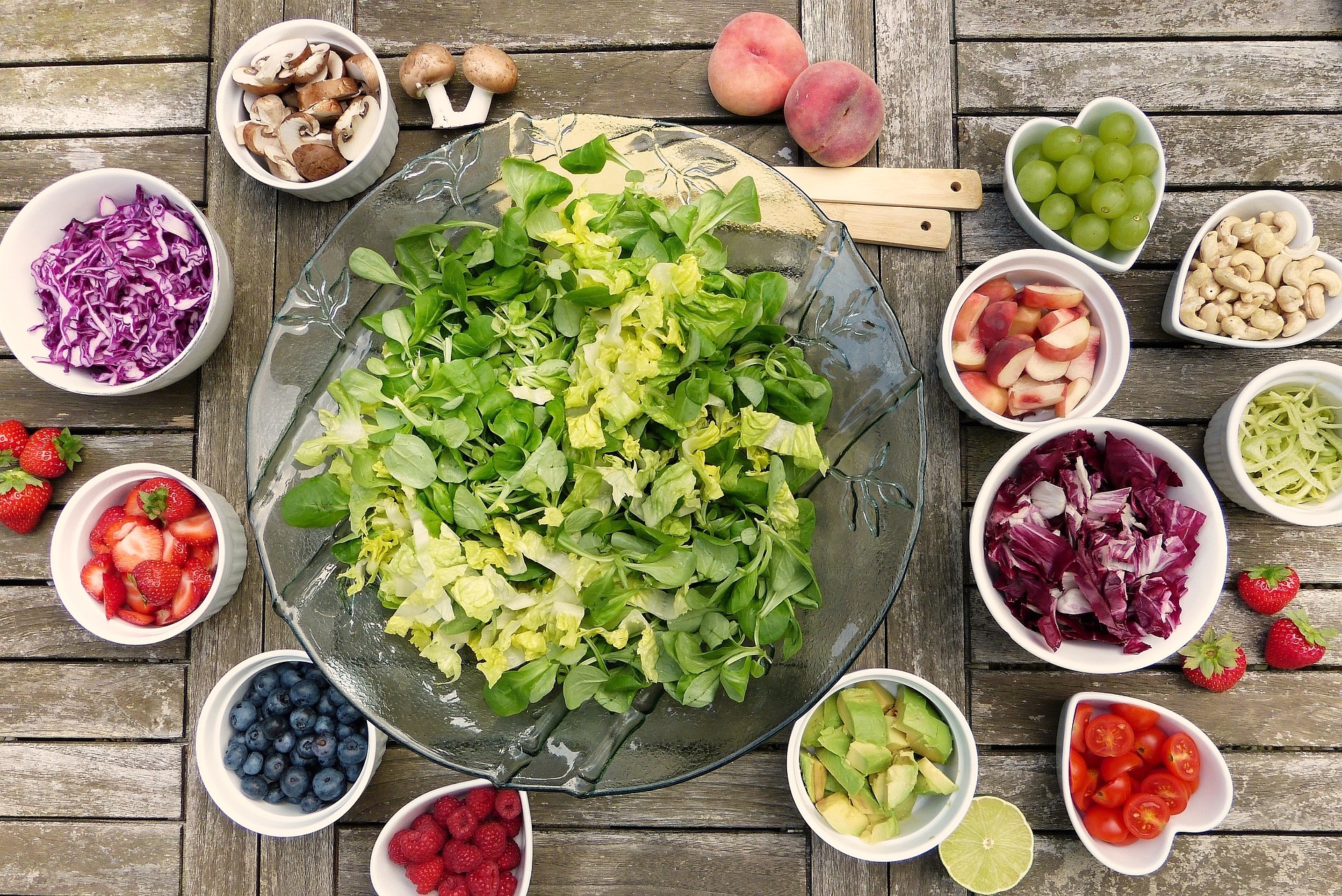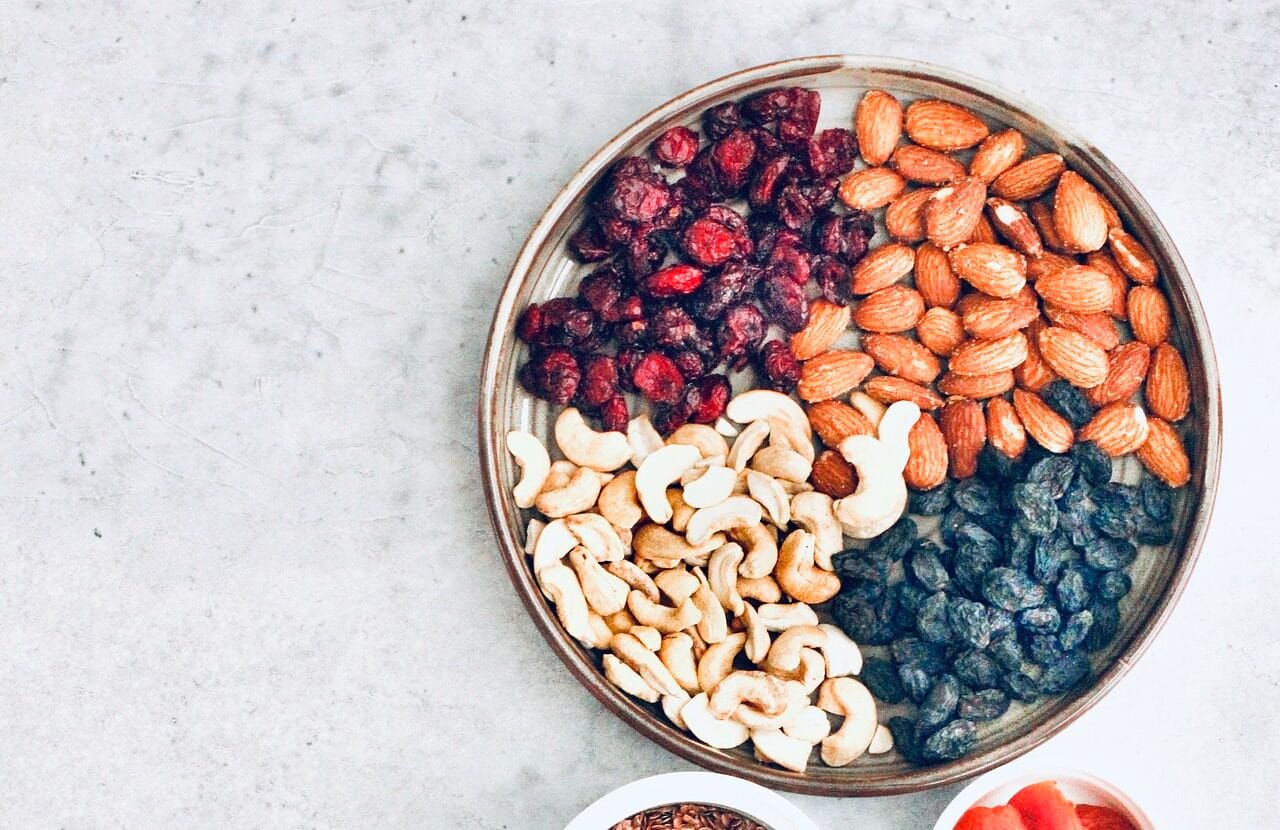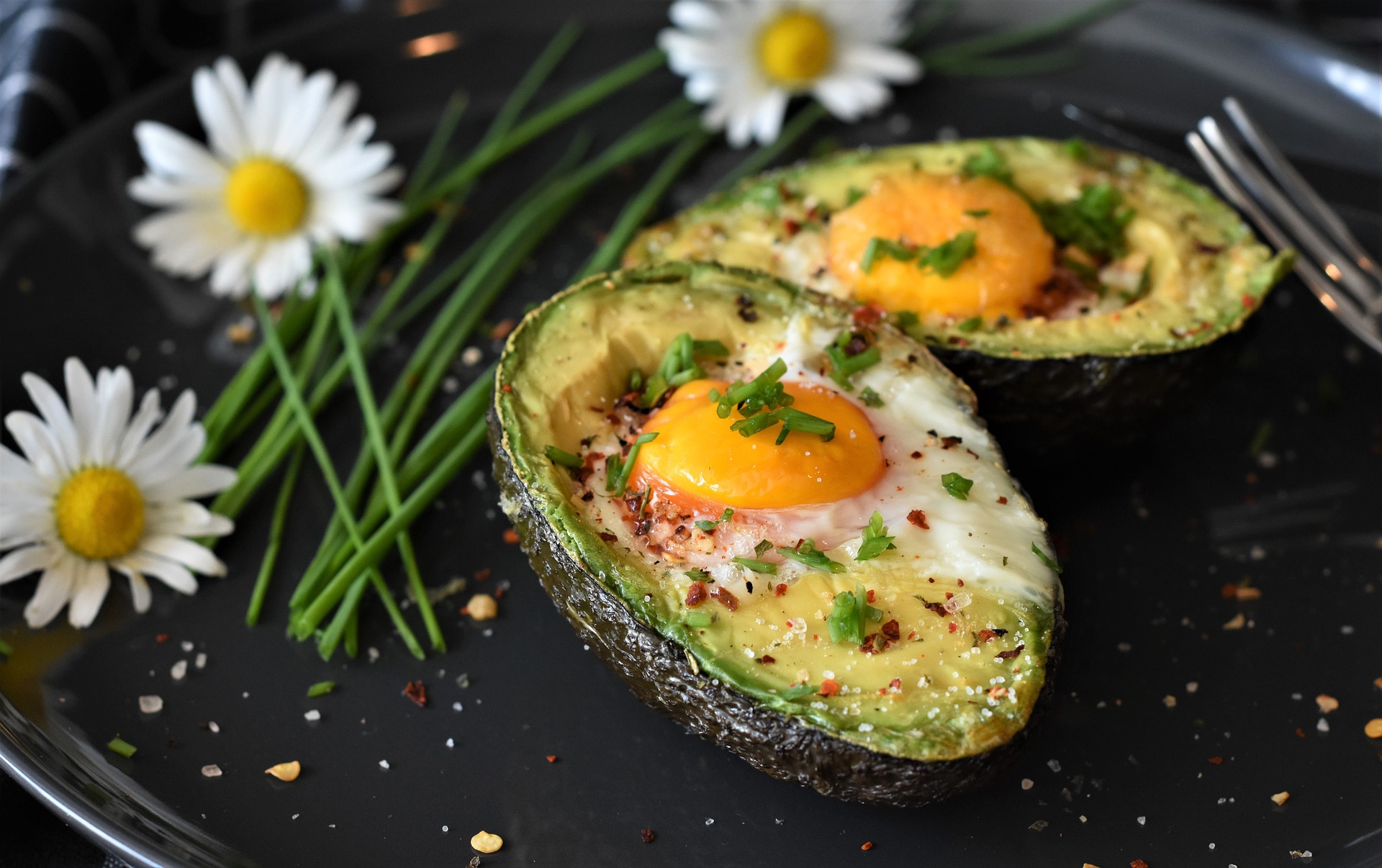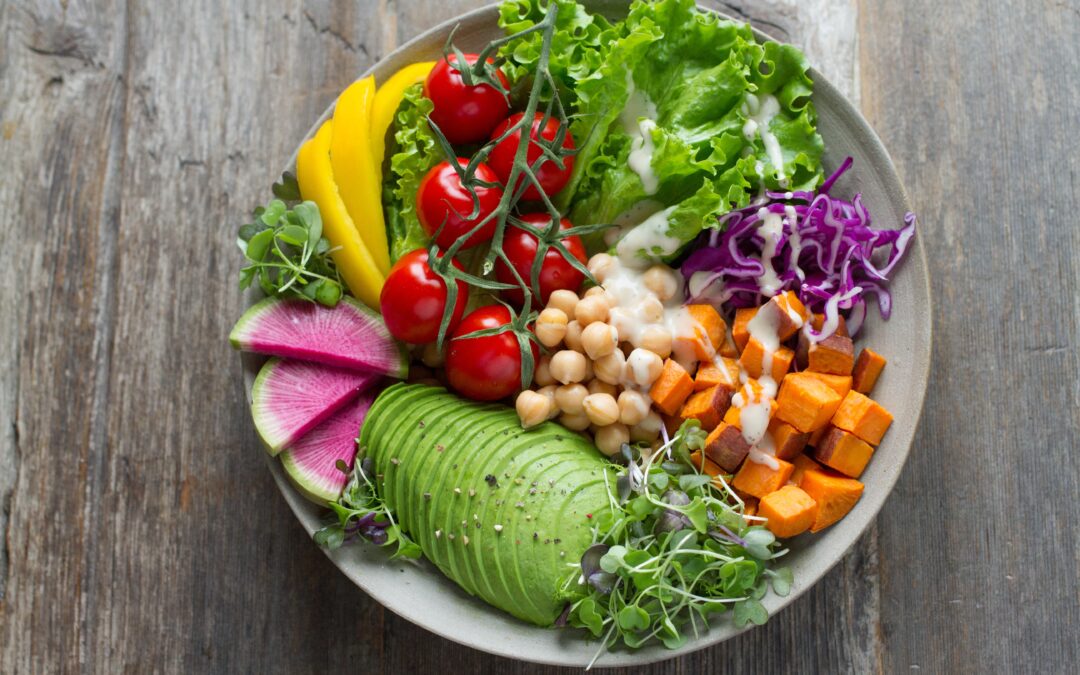1. The Volumetrics Diet
2. The Mediterranean Diet
3. The Flexitarian Diet
4. The Vegan Diet
5. The Paleo Diet
6. The DASH Diet
7. The MIND Diet
8. The Atkins Diet
9. The Plant-Based Diet
10. The Keto Diet
11 minute read
Choosing a suitable diet is essential when starting your healthy journey. Whether you’re trying to lose weight, improve your heart health, or your overall well-being, picking the right diet can make all the difference.
However, with so many diets out there, it can be overwhelming to figure out which one is the best and the easiest to follow – no one likes a complicated diet.
In this blog post, we will give an overview of the top 10 most popular diets today and explore their benefits and risks, and if it’s a great fit for your needs.
Top 10 Most Popular Diets
1. The Volumetrics Diet
The Volumetrics diet aims for weight loss and weight management by focusing on eating low-calorie, high-volume foods such as water-based fruits & veggies like lettuce and watermelons, to promote feelings of fullness and reduce overall calorie intake.
It focuses on the idea of feeling full without consuming significant calories.
You get to eat large portions of healthy nutrient-dense, whole foods like fruits, vegetables, whole grains, and lean proteins and still shed pounds.
The Volumetrics Diet is not restrictive, relatively easy to follow, and can be tailored to accommodate various dietary restrictions. It encourages cooking at home, though eating out is allowed as long as guidelines are followed. This diet is budget-friendly, with most foods available at typical grocery stores.
However…
One con with this diet is that this is solely focusing on calories and does not take into account the nutritional factor of the food.
While reducing calories is important for an effective weight loss, on the other hand you might be cutting back on the healthy fats, which have their own values for keeping your body healthy.
So it can be tedious to plan out each meal if you don’t have sufficient knowledge on having a balanced diet.
2. The Mediterranean Diet
The Mediterranean diet has been a long-time popular and proven diet to aid in weight loss and promote overall health.
The Mediterranean diet is based on the traditional cuisine of countries surrounding the Mediterranean Sea. It emphasizes consuming plant-based foods such as fruits and vegetables, whole grains, healthy fats, and lean protein, while limiting processed foods, red meat, and sugar.
Many studies have shown that the Mediterranean diet can improve cardiovascular health, lower blood pressure, and blood sugar levels, help with type 2 diabetes, obesity, and so many other health benefits. This diet has been shown to have short-term and long-term health benefits, making it one of the most popular diets.
Although the Mediterranean diet has many great benefit…
Maintaining this eating style might be difficult for some individuals because of the required prep time, food availability, and lack of nutritional guidance.

3. The Flexitarian
The Flexitarian diet offers a more flexible approach to healthy eating that encourages a plant-based diet with the occasional consumption of meat and animal products.
This can be a great option for those looking to reduce their meat intake without going fully vegetarian or vegan.
It is centered around consuming more fruits, vegetables, whole grains, and legumes, which are nutrient-dense foods that provide a variety of vitamins, minerals, and antioxidants that can help improve overall health.
Research has shown that the Flexitarian diet can be effective for weight loss, as well as reducing the risk of heart disease and type 2 diabetes. By consuming less meat and animal products, individuals may also reduce their risk of certain types of cancer.
However…
Following a Flexitarian diet requires careful planning to ensure proper nutrient intake, especially for essential nutrients like protein, iron, andvitamin B12.
Some individuals may also find it challenging to reduce their meat intake or may struggle to find healthy plant-based options when dining out or in social situations.
Overall, the Flexitarian diet offers a flexible approach to healthy eating that can provide numerous health benefits when properly followed, including the addition of low-sugar protein powder if and when necessary.
4. The Vegan Diet

The vegan diet excludes all animal-based products and by-products, such as meat, dairy, eggs, honey, and animal-derived ingredients like gelatin found in some candies.
This popular diet focuses on fruits, vegetables, whole grains, and legumes, as they contain important nutrients such as fiber, vitamins, and minerals.
Adopting a vegan diet offers numerous health benefits when it comes to preventing disease and overall health.
This plant-based lifestyle is associated with a lower risk of chronic illnesses, including heart disease and type 2 diabetes. This is due to the high intake of fiber, antioxidants, and phytonutrients found in fruits, vegetables, legumes, and whole grains.
In addition, the absence of saturated fats from animal products and the abundance of healthy fats from sources like avocados, nuts, and seeds, has helped people have lower cholesterol levels, lower blood pressure, and a healthier body mass index (BMI) compared to those on a typical omnivorous diet.
However…
Since you are cutting out a section of a food group, it can be hard to get certain essential nutrients like protein, iron, calcium, vitamin B12, and omega-3 fatty which are more commonly found in animal products.
Those looking to build muscle can get enough protein from plant-based sources, however, they may not always provide all the necessary amino acids in optimal amounts.
Furthermore, it can be easier to gain fat as opposed to muscle, if you’re not careful and mindful of what you eat, as some vegan foods can be highly processed, such as fake meats and fake cheeses.
These foods are often high in sodium, added sugars, and saturated fats, which can contribute to chronic disease and negatively impact health.
So it’s important to choose whole, nutrient-dense foods when following this diet, to avoid any negative effects on your health or weight loss journey.
5. The Paleo Diet
The Paleo diet, also known as the Paleolithic diet, was put together to mimic what our primal ancestors would eat in the past.
Simply put, this diet puts a heavy emphasis on eating whole foods such as meats, nuts, fish, eggs while completely cutting out processed foods, refined sugars and artificial sweeteners.
Also limiting dairy products, legumes and grains, since they were not as readily available in those times.

This diet has been shown to help in weight loss, improve various aspects of heart health, and help with common gastrointestinal issues such as bloating, gas, and constipation, due to the absence of dairy, grain, and legumes.
However…
This diet may not be suitable for those with certain medical conditions such as osteoporosis, due to the lack of dairy products.
Furthermore, due to the emphasis on meat, it may not be suitable for those with heart problems, as eating large portions of meat can contribute to higher cholesterol levels.
Therefore it’s important to mix in leaner meats like chicken breast, this will help manage your fat consumption.
6. The DASH Diet
Dietary Approaches to Stop Hypertension (The DASH diet), is another popular diet.
Rather than focusing on weight loss, this was designed to treat hypertension (high blood pressure), through limiting sodium intake, saturated fats and processed foods.
The diet is nothing too drastic, it requires you to have a balanced diet and have foods that are high in potassium, calcium and magnesium, while cutting out junk foods.
The only major that you might have difficulty with is the sodium intake. Per day your aim is to have only 1 teaspoon of salt or 2300 mg which is not a lot.
Research has shown that reducing overall sodium consumption had great benefit on lowering individuals blood pressure and reducing the risk of cardiovascular heart disease
However…
This diet may not be suitable for individuals that are looking to have significant weight loss, as this was designed to lower blood pressure.
In addition, this diet may not be suitable if you have chronic kidney disease or chronic liver disease, and are taking kidney-related medications. As always, talk to your healthcare provider before making a big change to your diet.
7. The MIND Diet
The MIND diet is a scientifically-backed eating plan that promotes brain health, reduces the risk of cognitive decline, and combines parts of the Mediterranean and DASH diets.
The MIND diet emphasizes consuming nutrient-rich foods such as leafy greens, berries, nuts, whole grains, fish, and poultry while limiting the consumption of processed foods like red meat, butter, and sweets. This can aid in weight management, and promote a healthy lifestyle and overall health.

Research has been shown consuming these types of foods reduces the risk of developing Alzheimers and dementia down the line.
One drawback…
Is that the MIND diet can be more expensive than processed foods as it emphasizes the use of fresh produce, fish, unprocessed ingredients, and other whole foods, potentially increasing grocery costs and meal-prepping time for some individuals.
In addition, this diet does not provide specific guidance on portion sizes or daily caloric intake, which may make it challenging for some individuals to determine how much they should be eating to achieve their health goals.
8. The Atkins Diet
The Atkins Diet is a low-carb, high-fat diet that has been popular for many years. It’s designed to help you lose weight by cutting out carbohydrates and replacing them with lean proteins and healthy fats.
By limiting carbohydrate intake, the body is forced to burn fat for energy, resulting in weight loss.
The Atkins Diet can help stabilize blood sugar levels, making it an attractive option for individuals with type 2 diabetes or pre-diabetes. Some individuals also choose the Atkins Diet for its potential to improve heart health, reduce triglycerides and increase HDL cholesterol levels.
However…
Certain types of sea foods & meat such as tuna, kidney, liver and anchovies contain high levels of the chemical compound called purine.
Purines are broken down into uric acid by the body and when there is an excess amount of these compounds, it can form uric acid crystals. If they aren’t cleared out by the kidneys, it can build up around joints & kidney and cause sharp pains or even permanent joint issues if high levels of are left untreated.
Therefore knowing how much protein, fats, and carbs to get in your specific diet for your particular goals is always going to yield better, safer, more sustainable weight loss results.
9. The Plant-Based Diet
Similar to the vegan diet, the plant-based diet is another upcoming and popular diet that is becoming a choice for many. This diet focuses on making long-term changes, as opposed to a quick fix.
A plant-based diet emphasizes the consumption of whole, nutrient-dense plant foods, minimally processed plant foods, and limiting or even eliminating animal products. A plant-based diet, when well-planned, can provide you with all the essential nutrients, such as vitamins, minerals, and macronutrients your body needs to function.
It can be a great choice if you are trying to lose weight. The high fiber content in plant-based foods will help you feel full which in turn helps with portion control and a reduced caloric intake.
This diet is associated with a lower risk of chronic diseases, such as heart disease, type 2 diabetes, and certain cancers. The high fiber and nutrient content in plant-based foods will help support a healthy digestive system and regular bowel movements.
However…
A plant-based diet can have some potential drawbacks if you’re not mindful. It may be more difficult to get proper amounts of nutrients, such as vitamin B12, iron, and omega-3 fatty acids.
Your food choices might be limited while on this diet depending on your location and access to a variety of plant-based options. This could make adhering to this diet more challenging and maintain it for the long-term.
10. The Keto Diet
The Keto diet is a very low-carb, high-fat diet that puts the body into a state of ketosis, where it burns fat for fuel instead of carbs.

This leads to rapid weight loss, improved insulin sensitivity, and reduced inflammation in the body. It can also be an effective treatment for neurological disorders, such as epilepsy and Alzheimer’s disease.
However…
It can be challenging to maintain and may not be suitable for those with certain medical conditions or dietary restrictions.
In addition, the keto diet may not be suitable for long-term practice as you may experience negative side effects such as low blood pressure (not in a good way), nutrient deficiencies, and higher cholesterol if you are not mindful of the fats you are eating.
You would need to carefully monitor your body, preferably with the assistance of a healthcare professional if possible, to make sure firstly you are reaching the state of ketosis and secondly you are not facing any serious adverse effects.
Final Thoughts
Choosing the right diet is a personal decision that should be based on your individual needs and goals. There’s a multitude of popular diets available today that offer a variety of health benefits and aid in achieving your fitness goals.
However, as with anything, it’s important to compare the benefits and risks and be mindful not to limit your intake of any essential nutrients required for optimal health.
Regardless of the diet you choose, exercising regularly and focusing on consuming wholesome, nutrient-dense foods is essential for your overall health and well-being.
We hope this guide has helped you understand the origins, principles, benefits, and risks of the top 10 most popular diets.
Remember, the most important thing is to find a diet that works for you and helps you achieve your health goals.
Happy Healthy Eating!

Hey, my name is Kevin and I am all about spreading positive information about living a healthy life. Leading a healthy life does not need to be complicated, there are plenty of easy methods that fit everyone. I share health & fitness topics over on my website raikevin.com~ feel free to check them out.

